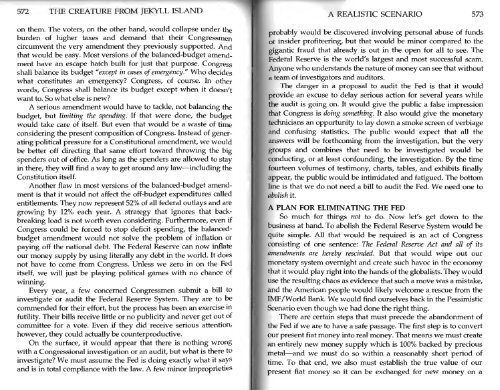You also want an ePaper? Increase the reach of your titles
YUMPU automatically turns print PDFs into web optimized ePapers that Google loves.
572 THE CREATURE FROM JEKYLL ISLAND<br />
on them. The voters, on the other hand, would collapse under the<br />
burden of higher taxes and demand that their Congressmen<br />
circumvent the very amendment they previously supported. And<br />
that would be easy. Most versions of the balanced-budget amendment<br />
have an escape hatch built for just that purpose. Congress<br />
shall balance its budget "except in cases of emergency." Who decides<br />
what constitutes an emergency? Congress, of course. In other<br />
words, Congress shall balance its budget except when it doesn't<br />
want to. So what else is new?<br />
A serious amendment would have to tackle, not balancing the<br />
budget, but limiting the spending. If that were done, the budget<br />
would take care of itself. But even that would be a waste of time<br />
considering the present composition of Congress. Instead of generating<br />
political pressure for a Constitutional amendment, we would<br />
be better off directing that same effort toward throwing the big<br />
spenders out of office. As long as the spenders are allowed to stay<br />
in there, they will find a way to get around any law—including the<br />
Constitution itself.<br />
Another flaw in most versions of the balanced-budget amendment<br />
is that it would not affect the off-budget expenditures called<br />
entitlements. They now represent 52% of all federal outlays and are<br />
growing by 12% each year. A strategy that ignores that backbreaking<br />
load is not worth even considering. Furthermore, even if<br />
Congress could be forced to stop deficit spending, the balancedbudget<br />
amendment would not solve the problem of inflation or<br />
paying off the national debt. The Federal Reserve can now inflate<br />
our money supply by using literally any debt in the world. It does<br />
not have to come from Congress. Unless we zero in on the Fed<br />
itself, we will just be playing political games with no chance of<br />
winning.<br />
Every year, a few concerned Congressmen submit a bill to<br />
investigate or audit the Federal Reserve System. They are to be<br />
commended for their effort, but the process has been an exercise in<br />
futility. Their bills receive little or no publicity and never get out of<br />
committee for a vote. Even if they did receive serious attention,<br />
however, they could actually be counterproductive.<br />
On the surface, it would appear that there is nothing wrong<br />
with a Congressional investigation or an audit, but what is there to<br />
investigate? We must assume the Fed is doing exactly what it says<br />
and is in total compliance with the law. A few minor improprieties<br />
"<br />
A REALISTIC SCENARIO 573<br />
probably would be discovered involving personal abuse of funds<br />
or insider profiteering, but that would be minor compared to the<br />
gigantic fraud that already is out in the open for all to see. The<br />
Federal Reserve is<br />
the world's largest and most successful scam.<br />
Anyone who understands the nature of money can see that without<br />
a team of investigators and auditors.<br />
The danger in a proposal to audit the Fed is that it would<br />
provide an excuse to delay serious action for several years while<br />
the audit is going on. It would give the public a false impression<br />
that Congress is doing something. It also would give the monetary<br />
technicians an opportunity to lay down a smoke screen of verbiage<br />
and confusing statistics. The public would expect that all the<br />
answers will be forthcoming from the investigation, but the very<br />
groups and combines that need to be investigated would be<br />
conducting, or at least confounding, the investigation. By the time<br />
fourteen volumes of testimony, charts, tables, and exhibits finally<br />
appear, the public would be intimidated and fatigued. The bottom<br />
line is that we do not need a bill to audit the Fed. We need one to<br />
abolish it.<br />
A PLAN FOR ELIMINATING THE FED<br />
So much for things not to do. Now let's get down to the<br />
business at hand. To abolish the Federal Reserve System would be<br />
quite simple. All that would be required is an act of Congress<br />
consisting of one sentence: The Federal Reserve Act and all of its<br />
amendments are hereby rescinded. But that would wipe out our<br />
monetary system overnight and create such havoc in the economy<br />
that it would play right into the hands of the globalists. They would<br />
use the resulting chaos as evidence that such a move was a mistake,<br />
and the American people would likely welcome a, rescue from the<br />
IMF/World Bank. We would find ourselves back in the Pessimistic<br />
Scenario even though we had done the right thing.<br />
There are certain steps that must precede the abandonment of<br />
the Fed if we are to have a safe passage. The first step is to convert<br />
our present fiat money into real money. That means we must create<br />
an entirely new money supply which is 100% backed by precious<br />
jQnetal—and we must do so within a reasonably short period of<br />
ime. To that end, we also must establish the true value of our<br />
present fiat money so it can be exchanged for new money on a


